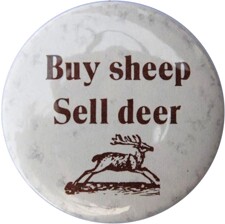Faith in the Market
Buy Sheep Sell Deer
Stock Market Video
In Case You Missed It
---
The stock market runs on faith.
Quite a lot of it honestly, which is why phrases like “investor confidence” are bandied about when discussing market timing. A high investor confidence rating means investors believe the market will go higher. A low rating, by contrast, means investors believe the market will hit a downward spiral. “Confidence,” in this context, is no different from faith. A high level of investor confidence means investors have faith the market will go higher.
I’m not talking about the religious kind of faith--although some traders might attend church/temple/mosque every day--the kind of faith I’m interested in is what the French philosopher Voltare called “believing when it is beyond the power of reason to believe.”
Professional and individual investors alike do hours upon hours of research on company fundamentals. They also use systems designed in such a way as to make money. This is all well and good, but at the end of the day you have to believe--have faith--that your system and your research will treat you well.
The reason faith plays a part is simple: No one owns a crystal ball or a time machine, and not a single person can predict the future. The team at Cabot and I ask you to believe in our systems, to have faith in us, because we’ve spent years studying the market and have developed, adopted and refined numerous successful investing systems. We don’t have a crystal ball, but we believe in our systems and that faith has been rewarded many times over.
This faith-based driver of the stock market is why it’s so very worrisome that Generation Y professionals have lost their faith in investing. Generation Y is loosely defined as people born between 1980 and 1995 (this range of birth years changes depending on who you talk to). A recent study by MFS Investment Management, a Boston-based company, revealed that 52% of professionals in this age group declared they would never feel comfortable investing in stocks.
News organization as varied as Reuters, The Los Angeles Times and The Boston Globe have, over the course of the past year, reported on this high number of young professionals who are uncomfortable putting money in the stock market. Their asset allocation is sometimes more like that of a person close to retirement--in some cases as low as 10% in stocks--than a person with decades to recover from losses in the market.
As you may or may not have figured out already, this is the age range I fall into. Looking at the stats on the MFS study is in some cases like looking into a mirror. Shocked at the downturn since 2008? Check. Starting off in my professional career? Check. Don’t have a lot of extra money to put toward the market? Check.
Financial industry professionals are rightly concerned about this trend, which is startlingly similar to the opinions of people who grew up in the shadow of the Great Depression of the 1930s. Assets are sitting in savings accounts or treasury bonds, which are seen as “safe,” rather than risking the wider market. Financial professionals interviewed in some of these articles told news outlets these young professionals are resistant even to the very idea of stocks, given the economic downturn since 2008.
The lack of faith is understandable; professionals like me weren’t at working age the last time the stock market had a pronounced uptrend. We came into the workforce at a time of increasing unemployment, extreme losses in the stock market and general lack of confidence--faith--in the economic future at large.
A quick glance at the financial media doesn’t help matters either. There’s high unemployment, slow gross domestic product (GDP) growth and mounting concern over the Eurozone. “Austerity” is the name of the game practically everywhere, and the doom and gloom message is enough to challenge anyone’s faith.
The people who do have faith in the market, however, are the ones quietly buying up stocks with great upside potential. Cabot Market Letter and Cabot Top Ten Trader Editor Michael Cintolo is one of these stock experts who sees the silver lining in the investing pipeline. If you subscribe to his newsletters, then you already know this and you’re making money in the 2012 bull market. Our other stock experts are enjoying similar success in their respective areas, but to benefit from their wisdom, you’ve got to have enough faith to make the leap.
My fellow Generation Y professionals who are reluctant to invest in stocks and prefer instead to keep their money in savings accounts and treasuries can’t be blamed for holding back. The stock market is a scary place to put your money, particularly for the inexperienced and unenlightened, who have no faith in the stock market as a wealth-generating powerhouse.
The faithful are the people who put their money in the market and keep it there to enjoy the potential gains. They have faith the market will make them money in the short- or long-term, but more importantly they have faith in the system they’ve chosen to make investing simpler.
So what’s the take-away from my overlong rambling? Having faith in the market, and faith in your investing system, is the only way to make any sort of significant gains when it comes to investing. Keep the faith, and the money will follow.
---
Here’s this week’s Contrary Opinion Button. Remember, you can always view all of the buttons by clicking here.
Buy Sheep Sell Deer
A corruption of “Buy cheap, sell dear,” and more fun to illustrate, too. The deer looks English to me. More common today is, “Buy low, sell high.”
---
In this week’s Stock Market Video, Cabot Market Letter and Cabot Top Ten Trader Editor Mike Cintolo discusses how we’re finally starting to see volume and gains stick in the past few weeks. Mike’s bullish going forward, but still emphasizes caution. Featured stocks: Buffalo Wild Wings (BWLD), Las Vegas Sands (LVS), Tripadvisor (TRIP), Seagate Technology (STX), BE Aerospace (BEAV), Equinix (EQIX) and J.C. Penney (JCP).
In case you didn’t get a chance to read all the issues of Cabot Wealth Advisory this week and want to catch up on any investing and stock tips you might have missed, there are links below to each issue.
Cabot Wealth Advisory 1/30/12 - Money Stays Where It’s Well Treated
On Monday, Cabot China & Emerging Markets Report Editor Paul Goodwin wrote about the flow of money based on Wriston’s Law; that capital will flow where it’s wanted and stay where it’s well treated. Paul also discussed the nature of ticker symbols. Featured stock: Yum! Brands (YUM).
---
Cabot Wealth Advisory 2/2/12 - Cyclical and Secular Market Trends
On Thursday, Cabot Market Letter and Cabot Top Ten Trader Editor Michael Cintolo wrote about market trends of a cyclical and secular nature. Secular trends, he explained, are those lasting for a decade or more, while cyclical trends occur on a shorter time frame. Mike also discussed predicting the market year based on January numbers. Featured stock: BE Aerospace (BEAV).
Yours in investing,
Matthew Delman
Editor, Cabot Wealth Advisory


